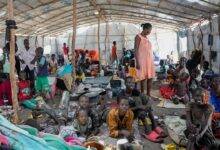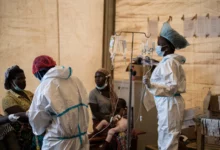
At least 20 civilians have been killed in an attack in the northeastern region of the Democratic Republic of the Congo (DRC), Reuters news agency has reported.
The attack occurred in the village of Kikura late Sunday, Odette Zawadi, the president of a local activist organisation, told the news agency.
The assailants struck at about 9 pm, wielding machetes and burning houses, the activist said. She and a local resident, Claude Kalinde, blamed the bloodshed on the Allied Democratic Forces (ADF) armed group.
The attack comes months after DRC and Ugandan troops launched a joint operation against the ADF, which has killed thousands of civilians in the region since 2013.
Since the operation began in late November, the group continued to attack and kill civilians. In December, at least 16 people were killed in an attack suspected to have been carried out by the group in the rural commune of Mangina.
“We already didn’t seem to have confidence in these so-called joint operations. How can you explain that 20 people are killed in the presence of these two forces?” Zawadi told Reuters.
Kalinde, who also said that 20 bodies had been recovered, said, “We thought that the coalition of the Congolese and Ugandan armies would help us, but look at how sad this is.”
The ADF was founded in Uganda in 1995. It later moved to the DRC where it is among dozens of armed groups seeking control over territory and mineral resources in the east of the country. Despite its pledged allegiance to ISIL (ISIS) in 2019, United Nations (UN) researchers have not found any evidence that the group still controlled the ADF.
Ugandan forces have launched air and artillery raids in the DRC since the beginning of the joint operation, pledging to stay in the neighbouring country for as long as necessary to defeat the ADF.
However, the intervention has alarmed some Congolese, who remained wary after Uganda plundered the country’s resources during the DRC’s second civil war that raged from 1998 to 2003.
Capitaine Antony Mwalushayi, a spokesman for DRC’s army, told Reuters that soldiers in the area had been slow to learn of the latest attack because the assailants did not use firearms.
“We cannot be discouraged because the objective of the enemy is to discourage us, to separate us from the population,” he said. -Reuters






